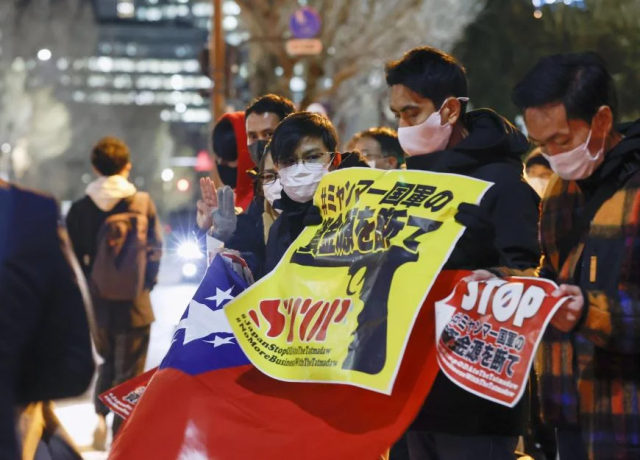Myanmar: Japan Construction Giant Should End Military Partnership


Myanmar people living in Japan protest against military rule in their country on the first anniversary of the coup, outside the Japanese prime minister’s office in Tokyo, February 1, 2022. © 2022 Kyodo via AP Images
Questions about Yokogawa Bridge Corp.’s Ties Since Coup Go Unanswered
(Tokyo) – Japan-based Yokogawa Bridge Corp. should end its partnership with a Myanmar military-owned conglomerate, Human Rights Watch said today. In a February 2, 2022, response to a Human Rights Watch letter, Yokogawa Bridge Corp. declined to disclose the status of its partnership with the Myanmar Economic Corporation (MEC), saying it did not comment on specific business deals.
On February 1, 2021, the Myanmar military overthrew the government and detained the democratically elected civilian leaders. Since then, Myanmar’s security forces have killed more than 1,500 people, including about 100 children, and detained over 10,000, according to the Assistance Association for Political Prisoners. Foreign companies should end ties with Myanmar’s military enterprises.
“If Yokogawa Bridge Corp. hasn’t done so already, it should immediately end its partnership with MEC without benefitting Myanmar’s military,” said Teppei Kasai, Asia program officer at Human Rights Watch. “Otherwise, it will be helping to fund military atrocities and risking its own reputation.”
In March 2014, Yokogawa Bridge Corp., a wholly-owned subsidiary of Japanese Yokogawa Bridge Holdings Corp., signed a Memorandum of Understanding (MoU) with MEC, according to a 2015 earnings document. MEC is owned by Myanmar’s Defense Ministry, controlled by the Quartermaster General’s Office, and is a “direct source of revenue” for Myanmar’s abusive military. According to the document, Yokogawa Bridge aims to “build a relationship through technical cooperation,” while “cultivating” MEC into an “amicable steel fabricator.”
“Technological transfer through on-the-job training” for MEC by Yokogawa Bridge Corp. began in September 2014, including “measures to increase productivity and quality” and “technical guidance of construction engineering,” according to the document. Yokogawa Bridge Corp. also created an office in Yangon in July 2015, which the company says acts as a base for “information gathering and technological transfer.”
In a Yokogawa Bridge Holdings Corp. document titled “Fifth mid-term business plan 2020 – March 2022,” the parent company said it will “strengthen” its relationship with MEC and seek “further development and expansion.”
Yokogawa Bridge Corp.’s ties to MEC came under scrutiny after a local media outlet, Myanmar Now, reported in March 2021 that a MEC-owned steel mill in Hmawbi, Yangon, was supplying steel for two-thirds of the Japanese government-backed Bago River Bridge Construction project. In April 2021, Yokogawa Bridge Holdings Corp. stated that construction of the bridge has been halted due to the “situation on the ground,” and that it would “conduct business that respects human rights.”
The 2015 earnings document detailing the nature of the MoU between Yokogawa Bridge Corp. and MEC was available for public viewing as of January 25, 2021. However, by May 12, 2021, documents dated before 2019, including the 2015 earnings document, had been removed. As of February 3, 2022, the documents remain unavailable on the company website.
MEC is owned by the Myanmar military, or Tatmadaw, generating vast revenue through businesses in sectors including manufacturing, mining, and telecommunications, according to a 2019 report by a United Nations-backed Fact-Finding Mission on Myanmar. The fact-finding mission concluded that “any foreign business activity” involving Myanmar’s military and its conglomerates including MEC pose “a high risk of contributing to or being linked to, violations of human rights law and international humanitarian law.” It added that “at a minimum, these foreign companies are contributing to supporting the Tatmadaw’s financial capacity.”
The fact-finding mission advocated the “financial isolation” of the military to deter violations of international human rights and humanitarian law. The United States, United Kingdom, European Union, and Canada have sanctioned MEC and the other military conglomerate, Myanmar Economic Holdings Limited (MEHL), for their role in generating significant revenues that help fund the military’s abuses and enshrine its impunity.
On May 12, 2021, the United Nations Working Group on human rights and transnational corporations and other business enterprises stated that “Businesses must uphold their human rights responsibilities and put pressure on the military junta to halt grave human rights violations.” Specifically, the Working Group urged companies to “act in line with the Guiding Principles on Business and Human Rights to avoid contributing to human rights violations, or becoming complicit in crimes if they continue to operate in Myanmar.”
The UN Guiding Principles on Business and Human Rights states that companies should “avoid causing or contributing to adverse human rights impacts through their own activities, and address such impacts when they occur,” and “seek to prevent or mitigate adverse human rights impacts that are directly linked to their operations, products or services by their business relationships, even if they have not contributed to those impacts.” Meaningful engagement, including communicating to stakeholders the steps a company has taken to mitigate risks and remedy harm already caused, are distinct responsibilities under these principles.
“Yokogawa Bridge Corp. and its parent company should be transparent about any existing business relationships with MEC and the steps they are initiating to end collaboration,” Kasai said. “Transparency and regular stakeholder engagement are important aspects of a company’s human rights due diligence responsibilities.”

